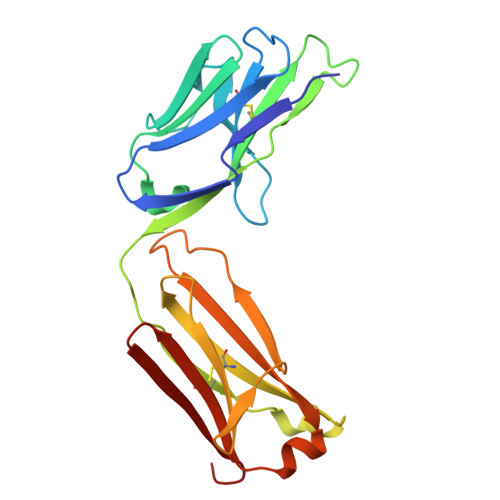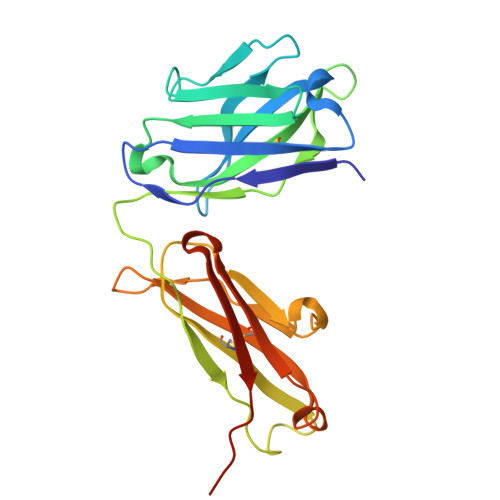Structural basis for the recognition of IFNAR1 by the humanized therapeutic monoclonal antibody QX006N for the treatment of systemic lupus erythematosus.
Chen, X., Ke, H., Li, W., Yin, L., Chen, W., Chen, T., Wu, Y., Qiu, J., Feng, W.(2024) Int J Biol Macromol 268: 131721-131721
- PubMed: 38649079
- DOI: https://doi.org/10.1016/j.ijbiomac.2024.131721
- Primary Citation of Related Structures:
8Y2K, 8Y31 - PubMed Abstract:
Interferon (IFN) alpha/beta receptor 1 (IFNAR1) is indispensable for antiviral responses and the immune regulation. Dysregulation of the IFNAR1-mediaetd signaling pathways leads to deleterious autoimmune diseases such as systemic lupus erythematosus (SLE). QX006N, a humanized therapeutic monoclonal antibody, specifically targets human IFNAR1 and is in the clinical trial phase for treating SLE, but the molecular mechanism underlying the QX006N-mediated recognition of IFNAR1 remains unclear. Here, we report the high neutralization activities of QX006N against IFNAR1-mediated signal transduction. Meanwhile, we determine the structures of the fragment antigen-binding domain (Fab) of QX006N (QX006N-Fab) and QX006N-Fab in complex with the subdomains 1-3 of IFNAR1 (IFNAR1-SD123) at 2.87 Å and 2.68 Å resolutions, respectively. In the structure of the QX006N-Fab/IFNAR1-SD123 complex, QX006N-Fab only recognizes the SD3 subdomain of IFNAR1 by the hydrophobic, hydrogen-bonding and electrostatic interactions. Compared with the structure of the IFN/IFNAR1/IFNAR2 complex, the binding of QX006N-Fab to IFNAR1-SD3 blocks its association with IFN due to steric hindrance, which inhibits the IFN/IFNAR1/IFNAR2 complex formation for signal transduction. The results of this study provide the structural evidence for the specific targeting of IFNAR1 by the therapeutic antibody QX006N and pave the way for the rational design of antibody drugs to combat IFNAR1-related autoimmune diseases.
- School of Life Sciences, Division of Life Sciences and Medicine, University of Science and Technology of China, Hefei 230026, China; Key Laboratory of Biomacromolecules (CAS), National Laboratory of Biomacromolecules, CAS Center for Excellence in Biomacromolecules, Institute of Biophysics, Chinese Academy of Sciences, 15 Datun Road, Beijing 100101, China.
Organizational Affiliation:

















